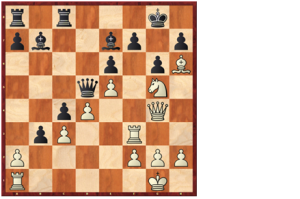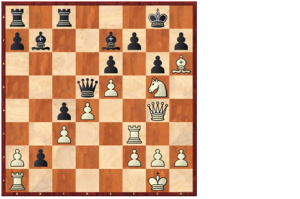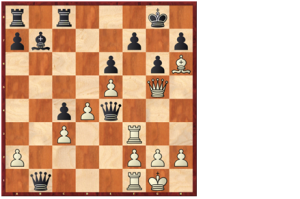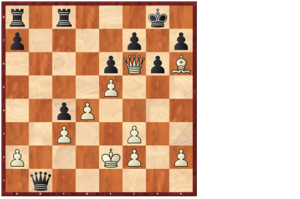Update: A clearer conclusion has been added.
There are many ways to improve in chess, and I shall list a few of them next time. But this week, I want to focus on just one area – analysing your own games (as well as those of others). The simple yet important point is that, as with everything else in life, if it is not done well, you will not feel the benefits.
Mauro – Marina Brunello, Perugia 2011

22…Bxg5 23.Qxg5 Qd8 24.Qf4? 24.Rf6 with a worse, but still playable, position was to be preferred. 24…Bxf3 Now Black wins. 25.gxf3 Rc6 26.Bg5 Qe8 27.Bh6 f5 28.exf6 Qf7 29.axb3 cxb3 30.Qe5 Rac8 31.Bd2 Rb6 32.Be3 b2 33.Rb1 Rb7 34.Bd2 a6 35.h4 Rb5 36.Qd6 Qxf6 37.Qxa6 Rcb8 38.Qd6 Qf5 39.Kg2 R5b6 40.Qd7 R6b7 0–1
22…b2 was better, in Marina’s opinion. She was following the computer’s line of thinking and concluded that Black was doing well after 23.Rf1 Rf8 and now either 24.Rh3 Bxg5 25.Qxg5 f6 26.Qg4 Qe4 and Black wins, or 24.Re3 Qa5 25.Bxf8 Rxf8 26.Rh3 Bxg5 27.Qxg5 f6! 28.Qe3 Qxa2 29.exf6 Bd5 30.Qh6 Rf7 and Black wins.
Checking over her analysis I asked the first question that came to mind.

Why should White go with the rook to f1 instead of b1, with the simple idea of taking the pawn? I put the move into the machine and immediately it went ballistic with 23.Rb1 Bxg5 24.Qxg5 Qe4, with the idea of …Qxb1 and …Qe1. But after 25.Rf1 b1=Q, things are not so simple:

Obviously it looks intimidating with two black queens on the board, but it does not require a lot of human brute force to find: 26.Qf6! Qxf1+ 27.Kxf1 Qb1+ 28.Ke2 Bxf3+ 29.gxf3
I am sure the computer was suffering from a horizon problem when it first approached this position and just counted the pennies. But as our regular readers will know, quality trumps quantity every time! Black has to take a perpetual check.
Conclusion: This is not a small point about computer horizons, as it came across at first. My apologies. The idea was to be inquisitive when analysing your own games. To ask questions (and if you like using a computer, then at least make it a dialogue) and to find the answers. To remember what you were thinking during the game and find out what was right and what was wrong. It is an excellent feedback opportunity on the 4-5 hours you spent playing the game. But if you just spacebar your way through it, copying down computer evaluations, your benefit will be slim to none. Invest your mind and soul in the analysis and you will reap great rewards.
Thank you to Marina for allowing me to use this example.

Unfortunately this question might be connected with some topics related to a certain book which should not be nominated, unless this blog’s owners were deciding to give away their site to a different publication company.
…
In the shown example, it seems to me that you point out haw a deeper calculation in the line of the most “natural” move would have brought the result home, with a fast handshake to follow and a point to split.
Beside the intention of the post, this gives the occasion to ask an experienced high level trainer if he could see a common way, or some common ways depending on the style and level of a player, to find a balance for this kind of situation:
trusting your own intuition with the risk of wasting a lot of time thinking about a losing line vs tourning your calculation time away, toward something less intuitive and familiar, with the risk of losing the thread?
…
If there is a positive answer, please make it related to an “any move of the game” frame: I developed an allergy to non-uncritical-not-long-periods-of-times kind of moves’ debates.
The answer is sadly that encountering lots of these situations and to evaluate them afterwards is the best method. This means analysing your games critically and to do challenging exercises. You develop a feel/intuition this way, which cannot be captured by a headline statement.
A great example of how the horizon effect is still relevant even with today’s compute power!
The computers are very strong at chess, but is easy to be fooled also. If you go over a GM-game with the computer, the GM often don’t play the computers best move, but the GM still win the game. Maybe the GM really missed the best move, but it could also be the horizon effect. Also you only need to play an enough good move to win, not the always the optimal best move.
Above make it difficult for weaker players to use engines and evaluate the computers lines. Sometimes it gives the best moves, sometimes not, and sometimes even a weaker players move can be ok. If it’s good enough.
I personally like to attempt to guess what lines the players have seen/missed and what were their motivation for the moves. This does get me the nickname “arrogant” or “jerk” at times, because apparently suggesting that we do not see everything is insulting. As I try not to listen to those that do not like what I do too much, I will continue to try to understand the reason for decisions and thus understand human chess better. Rather than just say that something is better because of the computer…
A recent example is 25…exd3? in Svidler – Carlsen in London. 25…Bxh3 would have won immediately because of a nice combination. When Carlsen was asked if he considered sacrificing the bishop after the game, he said no. Looked for maybe 10 seconds and said: this is of course entirely winning and then moved on to protect his confidence by saying: but what I played was so easy that I did not have to look for such things. In his annotations in NIC Giri gives the winning line, ending it with: this is of course not a line for mortals. But it is, Carlsen saw it in 10 seconds. I saw it in 2 minutes afterwards when I tried to understand why it was winning (I was in the press room at the time). It is easy to understand Giri, who has been told this line by a machine (just as the other journalists must have been, in order to ask), to believe that it was something hard that Carlsen missed. But actually, his focus was just not on tactics in the position and had they been, he would have won quickly.
Understanding why people make mistakes is very interesting; especially because it is not always the reason we might think.
A good reminder of the importance of thinking for yourself!
I recently talked to a strong player (IM, 2450) who told me he never uses an engine, not even to prepare in the opening. It just makes you passive he said and kills your creativity…
It is a nice example of the horizon effect, but under the headline “Analysing your own games” it pretty much feels like half a blog post. But maybe in the comments some good advice beyond “there is such a thing as the horizon effect” will come up.
I’m currently trying to analyze my last 20 losses and I’m definitely not quite sure how to go about it. I’m also looking at the games I played in an open last week, where I scored pretty well, but overlooked a tremendous amount of ideas and moves. My main problem with those games is how to factor in exhaustion. What kind of mistakes are just me and double round not being a good match and which mistakes point to some more fundamental flaws?
@Jonathan
As any tool, I think it can be misused. But I definitely like to ensure that I think personally as well!
Yes, my point is not entirely clear. I will fill in a clear conclusion.
Jacob, would you recommend to the player to write down the stuff he thought, calculated and conlcuded during the game first, together with his feelings, and only then make a detailed analysis ? Or do you think such a formal “game diary” procedure is unnecessary and a simple analysis will have a similar effect?
@Jacob Aagaard
Even I saw that move while watching the game in progress on the web site. (I didn’t calculate it out to a win, but…) I think the reason Carlsen missed this is simple. He’s a grinder, and this kind of sac is just not his style. It would be like asking a python to go for a quick kill.
@Andre
I do exactly that.
@The Lurker
Carlsen has played some fantastic combinations. Only at this point he was entirely focused in a different direction. But yes, he is less tactically inclined that many others.
@Jacob Aagaard
Well, yes, at world class level, they all play fantastic (to me) combinations at times.